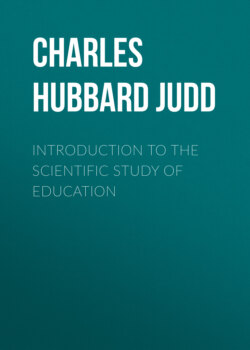Читать книгу Introduction to the scientific study of education - Charles Hubbard Judd - Страница 21
На сайте Литреса книга снята с продажи.
Influence of European Schools on the Educational System of This Country
ОглавлениеTable of Contents
It is not enough that we should see this contrast, however; we must learn its fuller meaning by looking into the history of our own school system. The fact is that we have not broken entirely away from the traditions of Europe. Our elementary school was borrowed directly from the Volksschule of Germany, and many of the readjustments which we are making to-day are nothing less than efforts to shake ourselves free from that disjointed scheme of education.
The time of this borrowing of the German Volksschule is clearly marked in our history. In the first three decades of the nineteenth century American schools were at a low level of development. A vivid picture of conditions in 1801 can be given by quoting from one of the earliest school reports that we have. The superintendent of the city of Taunton, Massachusetts, in a recent report reproduced this interesting historical document, of which we may quote certain sections in order to show the kind of school organization which prevailed at that date.
REPORT OF THE VISITING COMMITTEE OF TAUNTON IN 1801
The committee chosen by the town to inspect the schools beg leave to report their situation and examination....
January 6th, 1801. Your committee visited a school kept in Rueben Richmond’s house instructed by Mrs. Nabby Williams of 32 scholars. This school appeared in an uncultivated state the greater part of the scholars.
On the 26 of Feb., visited Mrs. Nabby Williams’ school the second time and found that the scholars had made great proficiency in reading, spelling, writing and some in the grammar of the English language.
Nov. 10th, the committee visited and examined two Schools just opened; one kept in a school house, near Baylies works, of the number of 40 scholars, instructed by Mr. Philip Lee. This School we found to have made but small proficiency in reading, spelling and writing, and to be kept only six or seven weeks; upon inquiry why it should be taught no longer, we were informed that the ratio of school money for this School was and had been usually expended in paying the Master both for his service and board, and in purchasing the fire wood which is contrary to the usual custom of the town.
The other School, visited the same day, was kept near John Reed’s consisting of the number of between 30 and 40 Scholars instructed by Mr. William Reed; This School, being formed into regular classes, appeared to have made a good and pleasing proficiency in reading, spelling, writing, some in arithmetic and others in the Grammar of the English language. This School’s share of school money is expended to pay the Master for his service only, so that the School will be continued three months.
On the 8th day of December they visited a School kept in a School house near Seth Hodges, in number 30 Scholars instructed by Mr. John Dunbar. This School appeared in a good way of learning, and to be kept four months.
On the 22nd of December your Committee visited two more Schools just opened, one in a School house near Samuel Pett’s of the number of 40 scholars instructed by Mr. Rufus Dean, and to be kept three months. This School appeared to be in a promising way of learning in reading spelling and writing and to be regularly taught.
The other School is kept in the home of Mr. Paul Chase and taught by Mr. Nicolas Stephens, consisting of 30 Scholars, and appears quite in a good way of learning especially in Spelling for scarcely a word passed a scholar misspelled, in writing some did very well and others in arithmetic appeared attentive.
January 8th, 1801 visited two Schools for the first time, one in the home of Mr. William Hodges of the number of 37 Scholars, instructed by Mr. Lovet Tisdale, the other in the home of Mr. Daniel Burt, of the number of 25 Scholars, instructed by Mr. Benjamin Tubbs. These Schools appeared in good order and attentive to their learning.
Feby. 26th, visited Mr. Dean’s School 2 times, the Scholars were crowded into a small room, the air was exceedingly noxious. Many children were obliged to tarry at home for want of room and though the school was kept only a few weeks they were deprived of its advantages. A want of books was the complaint. The committee were anxiously desirous that this evil might have a remedy and were of opinion it may be easily done. The Scholars appeared to increase in knowledge & claim our approbation.
March 5th, visited two schools, one kept at Mr. Aaron Pratt’s of the number of 30 scholars instructed by Mr. Philip Drown. This school appeared quite unimproved and uncultivated in reading and spelling, some of them did better in writing. This uncultivated state did not appear to be from a fault in the children but, as your committee were informed, from the disadvantage of having had masters illegally qualified for their instruction; of which class is their present master unauthorized by law.7
The situation here described was typical of all the settled towns. How much worse it was in sparsely settled districts one can easily imagine. Briefly put, one can say that up to 1830 schools throughout the country held short sessions in the middle of the winter when the pupils were otherwise unoccupied with home demands. There was no supervision except by visiting committees, no course of study, little or no material equipment, and small outlook for a higher education.
